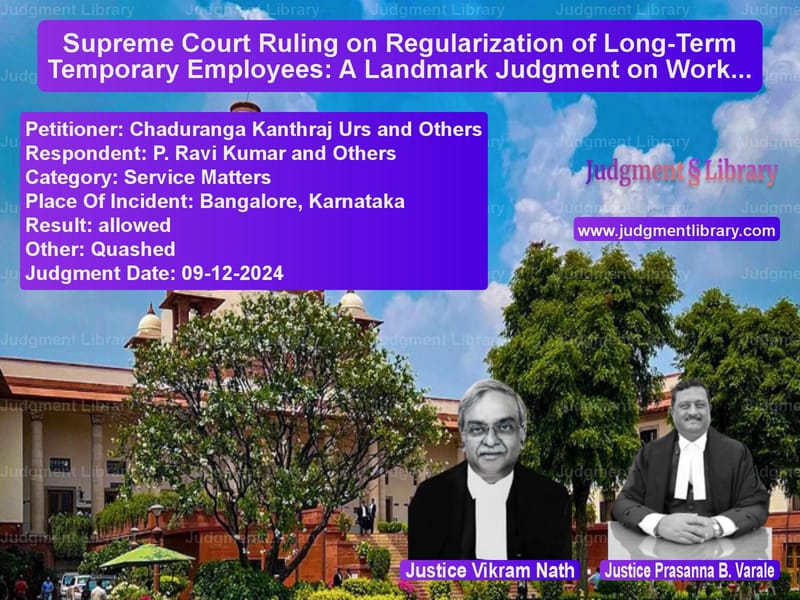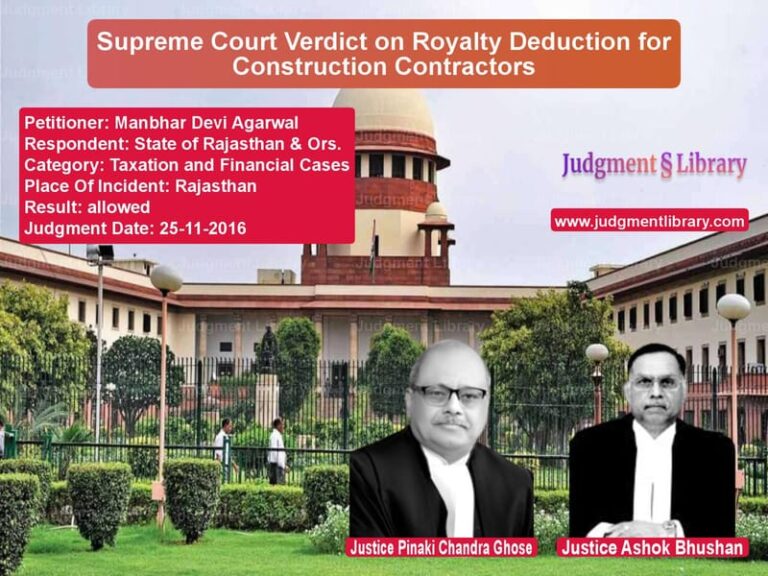Supreme Court Ruling on Regularization of Long-Term Temporary Employees: A Landmark Judgment on Worker Rights
The Supreme Court of India, in the case of Chaduranga Kanthraj Urs and Others vs. P. Ravi Kumar and Others, delivered a significant judgment on December 20, 2024, regarding the regularization of long-term temporary workers in the Central Water Commission (CWC). The petitioners, who had worked for several years in essential housekeeping and maintenance roles, sought regularization of their services after being terminated following the dismissal of their application before the Central Administrative Tribunal (CAT). The Court’s ruling sheds light on the treatment of long-serving temporary employees in government institutions and underscores the importance of fairness and justice in employment practices.
Background of the Case
The case originated from the engagement of the appellants (employees) by the Central Water Commission (CWC) on part-time, ad-hoc terms. The petitioners, who served as Safaiwalas (cleaners) and Khallasis (maintenance workers), were employed in the CWC’s offices in Faridabad, performing essential duties such as cleaning, dusting, gardening, and maintaining office premises. The appellants’ roles were integral to the day-to-day functioning of the CWC, yet their employment was considered temporary and contractual, without the benefits and job security afforded to regular employees.
Initially, the appellants sought regularization by filing Original Application No. 2211/2015 before the Tribunal, arguing that their long and uninterrupted service, spanning over ten years, entitled them to permanent status. However, the Central Administrative Tribunal (CAT), by its order dated April 17, 2018, dismissed the application. Subsequently, the appellants approached the High Court with a writ petition, challenging the CAT’s order and seeking reinstatement and regularization.
In August 2023, the High Court dismissed the writ petition, agreeing with the CAT’s decision and emphasizing that the appellants did not fulfill the criteria for regularization, including the minimum qualifications and duration of service required for permanent appointment. Aggrieved by the decision, the appellants approached the Supreme Court with appeals.
Legal Issues Raised
- Whether long-term temporary employees in government institutions, engaged in essential roles, should be regularized despite not meeting the prescribed criteria for regular posts.
- Whether the principles laid down in Uma Devi (2006) regarding the regularization of temporary employees should be applied to employees engaged in integral and continuous service.
- Whether the arbitrary termination of the petitioners’ services, without due process, violated principles of natural justice.
Arguments Presented
Arguments by the Petitioners
- The petitioners argued that their long and continuous service of over a decade, without any break in employment, made them eligible for regularization under the principles of fairness, equity, and justice.
- They emphasized that their work was not temporary or casual but integral to the functioning of the CWC, and that they had been assigned duties akin to those of regular employees.
- The petitioners contended that despite their satisfactory performance, they had been denied regularization based solely on the labels of their initial employment contracts, which were temporary and ad-hoc.
- Furthermore, they argued that the respondents had failed to follow the principles of Uma Devi, which allowed for regularization in cases of long-serving employees engaged in essential, recurring tasks.
- The petitioners also highlighted that their termination was arbitrary, as they were not given any notice or hearing, violating the principles of natural justice.
Arguments by the Respondents
- The respondents argued that the appellants were employed on a temporary, part-time basis, and their services were never intended to be permanent. They asserted that the appellants were not appointed against sanctioned posts, and therefore could not claim a right to regularization.
- They emphasized that the appellants did not meet the criteria for regularization, as they did not satisfy the minimum service duration or fulfill the educational qualifications typically required for regular posts.
- The respondents also contended that the appellants’ services were outsourced after their termination, and this outsourcing decision was a legitimate policy decision aimed at improving efficiency in the CWC’s operations.
- The respondents argued that regularization was not a vested right and that the appellants had no legal entitlement to permanent employment simply because they had served for a long period.
Supreme Court’s Observations
On the Nature of Employment and Regularization
The Court observed that while the appellants’ initial employment was part-time and contractual, their long and continuous service for periods ranging from over ten to nearly twenty years could not be ignored. The Court noted:
“The appellants’ service, though initially contractual, was not temporary in nature. Their roles were integral to the smooth functioning of the CWC. It is not the label of ‘temporary’ or ‘part-time’ that determines the right to regularization, but the nature of the work performed and the duration of service.”
On the Application of Uma Devi Principles
The Court then examined the applicability of the principles laid down in Uma Devi (2006), which restricted the regularization of employees appointed irregularly. The Court clarified that:
“The Uma Devi judgment sought to curb the regularization of illegal appointments, but it also recognized that employees performing essential duties on a continuous basis for several years should be considered for regularization. The appellants’ long-term service, absence of adverse performance records, and the nature of their work make them eligible for regularization.”
On the Arbitrary Termination of Services
The Court noted that the termination of the appellants’ services without prior notice or hearing violated the principles of natural justice. The Court held:
“The abrupt termination of the appellants, after their original application was dismissed, violated basic principles of fairness. Even contractual employees are entitled to a fair hearing before termination, especially when they have rendered satisfactory service over many years.”
Final Verdict
- The Supreme Court allowed the appeals and quashed the orders of termination issued on October 27, 2018.
- The Court directed the respondents to reinstate the appellants to their posts immediately and regularize their services as per applicable rules and procedures.
- The appellants were entitled to continuity of service for the period between their termination and reinstatement, and their post-retiral benefits would include this period as service.
- The Court clarified that the appellants would not be entitled to back wages or pecuniary benefits for the period they were not employed but would be entitled to the continuity of service for post-retiral benefits.
Implications of the Judgment
- Fairness in Employment Practices: The ruling reinforces the importance of fair treatment for long-serving employees, ensuring that workers engaged in essential roles are not unjustly deprived of regularization opportunities.
- Upholding Natural Justice: The judgment highlights the need for adherence to principles of natural justice, especially in cases of termination of service, ensuring that employees are not arbitrarily dismissed without due process.
- Regularization of Long-Term Employees: This case sets a significant precedent for the regularization of long-term temporary employees in government institutions, particularly those engaged in core and ongoing roles.
- Employee Rights and Legal Entitlement: The ruling affirms that long-term service in government positions, even on temporary terms, can entitle workers to regularization under fair conditions.
The Supreme Court’s decision marks a vital step toward securing the rights of workers employed on temporary terms and ensuring fair treatment for those whose roles are essential to public administration and governance.
Petitioner Name: Chaduranga Kanthraj Urs and Others.Respondent Name: P. Ravi Kumar and Others.Judgment By: Justice Vikram Nath, Justice Prasanna B. Varale.Place Of Incident: Bangalore, Karnataka.Judgment Date: 09-12-2024.
Don’t miss out on the full details! Download the complete judgment in PDF format below and gain valuable insights instantly!
Download Judgment: chaduranga-kanthraj-vs-p.-ravi-kumar-and-ot-supreme-court-of-india-judgment-dated-09-12-2024.pdf
Directly Download Judgment: Directly download this Judgment
See all petitions in Employment Disputes
See all petitions in Public Sector Employees
See all petitions in Workplace Harassment
See all petitions in Judgment by Vikram Nath
See all petitions in Judgment by Prasanna Bhalachandra Varale
See all petitions in allowed
See all petitions in Quashed
See all petitions in supreme court of India judgments December 2024
See all petitions in 2024 judgments
See all posts in Service Matters Category
See all allowed petitions in Service Matters Category
See all Dismissed petitions in Service Matters Category
See all partially allowed petitions in Service Matters Category







